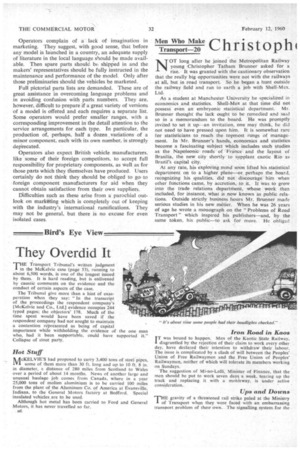young Christopher Tatham Brunner asked for a
Page 40

If you've noticed an error in this article please click here to report it so we can fix it.
11\T OT long after he joined the Metropolitan Railway
young Christopher Tatham Brunner asked for a
rise. It was granted with the cautionary observation that the really big opportunities were not with the railways at all, but in road transport. So he began a hunt outside the railway field and ran to earth a job with Shell-Mex.
Ltd. . .
As a student at Manchester University he specialized in economics and statistics. Shell-Mex at that time did not possess even an embryonic statistical department. Mr. Brunner thought the lack ought to be remedied and said so in .a memorandum to the board. He was promptly invited to set it up—an invitation, one may think, he did not need to have pressed upon him. It is somewhat rare for statisticians to reach the topmost rungs of management. In Mr. Brunner's hands, economics and statistics become a fascinating subject which includes such studies as the Napoleonic roads of 'France and the layout of Brasilia, the new city shortly to supplant exotic Rio as
Brazil's capital city. .
At any rate, his exploring mind soon lifted his statistioal department. on to a higher plane—or perhaps the board, recognizing his .qualities, did not discourage him when other functions came, by accretion, to it. It was to grow into the trade relations department, whose work then included, for instance, what is now known as public relations. " Outside strictly business hours Mr. Brunner made serious studies in his new métier. When he was 26 years of age he wrote a monograph on the "Problems of Road Transport" which inspired his publishers—and, by the same token, his public—to ask for more. •He . obliged Operators complain of a. lack of imagination in marketing. They suggest, with good sense, that before any model is launched in a country, an adequate supply of literature in the local language should be made available. Then spare parts should IN, shipped in and the makers' representatives should be fully instructed in the maintenance and performance of the model. Only after those preliminaries should the vehicles be marketed.
Full pictorial parts lists are demanded. These are of great assistance in overcoming language problems and in avoiding confusion with parts numbers. They are, however, difficult to prepare if a great variety of versions of a model is offered and each requires a separate list. Some operators would prefer smaller ranges, with a corresponding improvement in the detail attention to the service arrangements for each type. In particular, the production of, perhaps, half a dozen variations of a minor component. each with its own number, is strongly deprecated.
Operators also expect British vehicle manufacturers. like some of their foreign competitors, to accept full responsibility for proprietary components, as well as for those parts which they themselves have produced. Users certainly do not think they should be obliged to go to foreign component manufacturers for aid when they cannot obtain satisfaction from their own suppliers.
bifficulties such as these arise from a parochial outlook on marketing which is completely out of keeping with the industry's international ramifications. They may not be general, but there is no excuse for even isolated cases.




















































































































